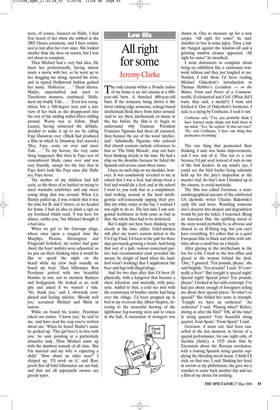All right for some
Jeremy Clarke
The only cinema within a 30-mile radius of my home is an Art cinema in a 400year-old barn. A thatched 400-year-old barn. If the nonsense being shown is the latest cutting-edge nonsense, cottage-based intellectuals flock there from miles around. And to see these intellectuals en masse in the bar before the film is to begin to understand why Guinean President Francisco Nguema had them all executed, then banned the use of the word ‘intellectual’. Admittedly, Nguema, who ordered that church sermons include references to him as ‘The Only Miracle’, may not have been thinking clearly at the time. He had a chip on his shoulder because he failed the Spanish civil service exam three times.
I have no such chip on my shoulder, however. It was conclusively revealed to me at school that I was a fool, had always been a fool and would die a fool; and at the school I went to, you took that as a compliment. And looking around at the local intelligentsia self-consciously sipping their prefilm dry white wines at the bar, I realised I was right to do so. The last time I saw congenital feebleness in both sexes as bad as that, the whole litter had to be destroyed.
But I might not have been thinking very clearly at the time, either. Grief-stricken still after my team’s narrow defeat in the FA Cup Final, I’d been in the pub for three days previously growing a beard. And being that sort of a pub, various concerned parties had recommended (and provided the means, by sleight of hand when the landlord wasn’t looking) that I supplement the beer and fags with illegal drugs.
And for two days after that I’d been ill: physically, with a hangover that became a chest infection; and mentally, with paranoia. Added to that, a cold sea mist with the consistency of bonfire smoke had hung over the village. I’d been propped up in bed in my overcoat like Albert Steptoe, listening to the mournful hooting of the lighthouse fog-warning siren and to voices in the hall. A succession of strangers was shown in. One to measure up for a new carpet. ‘All right for some!’ he said. Another to box in some pipes. Then a ladder banged against the window-sill and a grinning window cleaner appeared. ‘All right for some!’ he mouthed.
I went downstairs to complain about being on exhibition like a cautionary waxwork tableau and they just laughed at me. Nettled, I told them I’d been reading Michael Oakeshott’s introduction to Thomas Hobbes’s Leviathan — or the Matter, Form and Power of a Commonwealth, Ecclesiastical and Civil. (What did I want, they said, a medal?) I went and fetched it. One of Oakeshott’s footnotes, I said, is a saying by Confucius. I read it out:
Confucius said, ‘T’zu, you probably think I have learned many things and hold them in my mind.’ ‘Yes,’ he replied. ‘Is that not true?’ ‘No,’ said Confucius, ‘I have one thing that permeates everything.’
The one thing that permeated their thinking, I said, was home improvements, and I was sick of it. This led to a row because I’d put seed instead of nuts in one of the bird feeders. In my mind’s eye, I could see the bird feeder being solemnly held up for the jury’s inspection at the murder trial. So that’s how I finished up in the cinema, to avoid matricide.
The film was called Factotum, a semiautobiographical account of the celebrated US alcoholic writer Charles Bukowski’s early life and loves. Watching someone else’s descent into despair and degradation would be just the ticket, I reasoned. Being an American film, the uplifting moral to the story would probably be as obvious and absurd as an ill-fitting wig, but you can’t have everything. It’s either that or a quiet European film in black and white with subtitles about a small boy on a bicycle.
After glaring at the intellectuals in the bar for a bit, I went to the box office and glared at the woman behind the desk. ‘One,’ I grunted. ‘Ten pounds, please,’ she said brightly. ‘Ten pounds!’ I said. ‘It’s normally a fiver!’ ‘But tonight is special night! Special night! Special price! Ten pounds, please!’ I looked at her with contempt. I’ve had just about enough of foreigners telling me about their special prices. ‘So what’s so special?’ She folded her arms in triumph. ‘Tonight we have an orchestra!’ ‘An orchestra!’ I said. ‘Playing when? Before, during or after the film?’ ‘Oh, all the time! Is string quartet! Very beautiful string quartet, from Spain.’ ‘From Spain!’ I said.
Factotum, it turns out, had been cancelled at the last moment, in favour of a special performance, for one night only, of Stachka (Strike), a 1925 silent film by Eisenstein about the Russian revolution, with a touring Spanish string quartet supplying the bleeding mood music. I think I’ll stick on that one, I said. Shaking her head in sorrow at my philistinism, she gave me a voucher to come back another day and see a film of my choice for nothing.










































































































 Previous page
Previous page